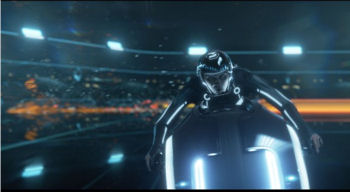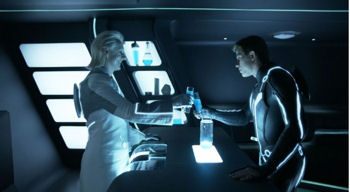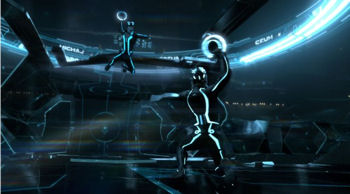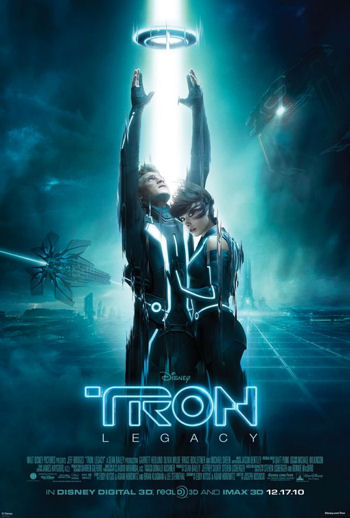|
TRON Legacy
Thanks to TRON, I've always had the nagging feeling that my poor computer game playing skills was condemning hapless programs to their deaths. It didn't make sense, but that's one of the glories of that original movie – great ideas and imagery that overcome how little actual logic may be there. With TRON, it's about the ride – and that would be a lightcycle ride, thank you.
So the good news about TRON: Legacy, the unlikely but appreciated sequel, is that at its best, it updates the original concepts , dazzling with state of the art technology and pushing the envelope a little bit with the inclusion of its villain CLU.
The fabled tournament games have upped the ante, giving the hallucinogenic Speed Racer a run for its money in terms of spectacle. If it's occasionally hard to keep track of who's riding which lightcycle, it's forgiven because it just pulses so well. Later, the concept moves to the sky, and that works well, too.
At its core, it also has some good big ideas. Sam Flynn (Garrett Hedlund) keenly feels the loss of his father Kevin (Jeff Bridges), but even in his resentment at his perceived abandonment, he can't help but be just like his old man. Compare that to Kevin's other offspring, CLU, a personality incapable of change, and there should be an interesting dynamic with catastrophic conflict.
It's all sort of there, but screenwriters Edward Kitsis and Adam Horowitz seem more interested in having characters talk instead of act, and when they aren't getting bogged down in pseudo-philosophical concerns they're spouting lines either taken from the first movie or out of a bad Saturday afternoon serial.
 Director Joseph Kosinski indulges this with panoramic visuals, but when the dialogue falls flat – such as a menacing but pointless tracking shot up to CLU (Bridges) saying "come on, come on" out to nowhere – the spectacle becomes a waste of time. Director Joseph Kosinski indulges this with panoramic visuals, but when the dialogue falls flat – such as a menacing but pointless tracking shot up to CLU (Bridges) saying "come on, come on" out to nowhere – the spectacle becomes a waste of time.
In order to get to the events of Legacy, a lot didn't just have to have happened; it also had to be explained, and that, too, slows things down. An entire civilization of new life forms rose and fell after Flynn moved everybody to a new server, and that back story raises more questions than it answers. Perhaps that's for the sequel.
That potential for a sequel strengthens and weakens things. While CLU poses a vague threat to the outside world, it seems that this digital civilization has been made completely separate from reality. In the original, even though it didn't make much sense, the Master Control Program was actively forming an internet prototype and devouring programs. Here, the internet does not intrude; even the warning from "The Grid" comes via pager.
 But if you just let yourself be immersed in the world of TRON and glide over the explanations, there's a lot to absorb you. The 2D versus 3D world (if you see it in 3D) is a nice effect, not quite necessary to appreciation of the movie, but definitely an enhancement to the experience. The environment is spectacular, and more so than in the original film, there are characters to really stand out and provide fun moments. But if you just let yourself be immersed in the world of TRON and glide over the explanations, there's a lot to absorb you. The 2D versus 3D world (if you see it in 3D) is a nice effect, not quite necessary to appreciation of the movie, but definitely an enhancement to the experience. The environment is spectacular, and more so than in the original film, there are characters to really stand out and provide fun moments.
Bridges does make the most of his dual role, providing a good contrast between the slightly spacy Flynn and his digital doppelganger CLU. Hedlund proves a stolid leading man, not given much to do besides just keep moving forward -- but that kind of happened to Bruce Boxleitner in the original, and I'll just say here that he isn't given nearly enough to do.
Providing just a hint of love interest and sexuality, Olivia Wilde strikes an effective balance between being dangerously aggressive and childishly naïve. Through it all, she maintains a sense of wonder that makes perfect sense for her character.
 The Grid now has room for a lot of different personalities, though it's not quite explained how. As the toadying Jarvis, James Frain is almost unrecognizable but memorable. Michael Sheen channels and frappes David Bowie and Malcolm McDowell as a cybernightclub owner. Who knew computer programs needed a place to hang out and dance? The Grid now has room for a lot of different personalities, though it's not quite explained how. As the toadying Jarvis, James Frain is almost unrecognizable but memorable. Michael Sheen channels and frappes David Bowie and Malcolm McDowell as a cybernightclub owner. Who knew computer programs needed a place to hang out and dance?
Of course, with a score by Daft Punk, that makes sense. A worthy successor to the original work by Wendy Carlos, the duo's pulsing beats drive and underscore but never overwhelm. It was an inspired choice by Kosinski, and whatever other flaws this movie may have, it's obvious that TRON Legacy was made from a place of love for the original with a genuine desire to evolve.
It could have been better. It should have been better. But then, that's what Flynn argued all along.
|

 Director Joseph Kosinski indulges this with panoramic visuals, but when the dialogue falls flat – such as a menacing but pointless tracking shot up to CLU (Bridges) saying "come on, come on" out to nowhere – the spectacle becomes a waste of time.
Director Joseph Kosinski indulges this with panoramic visuals, but when the dialogue falls flat – such as a menacing but pointless tracking shot up to CLU (Bridges) saying "come on, come on" out to nowhere – the spectacle becomes a waste of time. But if you just let yourself be immersed in the world of TRON and glide over the explanations, there's a lot to absorb you. The 2D versus 3D world (if you see it in 3D) is a nice effect, not quite necessary to appreciation of the movie, but definitely an enhancement to the experience. The environment is spectacular, and more so than in the original film, there are characters to really stand out and provide fun moments.
But if you just let yourself be immersed in the world of TRON and glide over the explanations, there's a lot to absorb you. The 2D versus 3D world (if you see it in 3D) is a nice effect, not quite necessary to appreciation of the movie, but definitely an enhancement to the experience. The environment is spectacular, and more so than in the original film, there are characters to really stand out and provide fun moments. The Grid now has room for a lot of different personalities, though it's not quite explained how. As the toadying Jarvis, James Frain is almost unrecognizable but memorable. Michael Sheen channels and frappes David Bowie and Malcolm McDowell as a cybernightclub owner. Who knew computer programs needed a place to hang out and dance?
The Grid now has room for a lot of different personalities, though it's not quite explained how. As the toadying Jarvis, James Frain is almost unrecognizable but memorable. Michael Sheen channels and frappes David Bowie and Malcolm McDowell as a cybernightclub owner. Who knew computer programs needed a place to hang out and dance?




